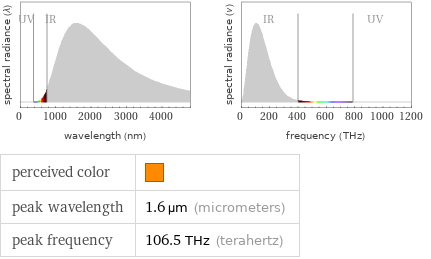Input interpretation

iron(II, III) oxide | melting point
Result

1538 °C (degrees Celsius)
Unit conversions

1811 K (kelvins)

2800 °F (degrees Fahrenheit)

3260 °R (degrees Rankine)

1230 °Ré (degrees Réaumur)

815 °Rø (degrees Rømer)
Comparisons as temperature

130 °C below melting point of titanium (1668 °C)

58.85 °C below temperature of a Bunsen burner flame (1870 K)

≈ melting point of iron (1538 °C)
Blackbody information

perceived color | peak wavelength | 1.6 µm (micrometers) peak frequency | 106.5 THz (terahertz)
Corresponding quantities

Thermodynamic energy E from E = kT: | 16 ceV (centielectronvolts)

Blackbody energy flux Φ from Φ = σT^4: | 610140 W/m^2 (watts per square meter)

Approximate luminous exitance from a planar blackbody radiator perpendicular to its surface: | 401521 lx (lux)